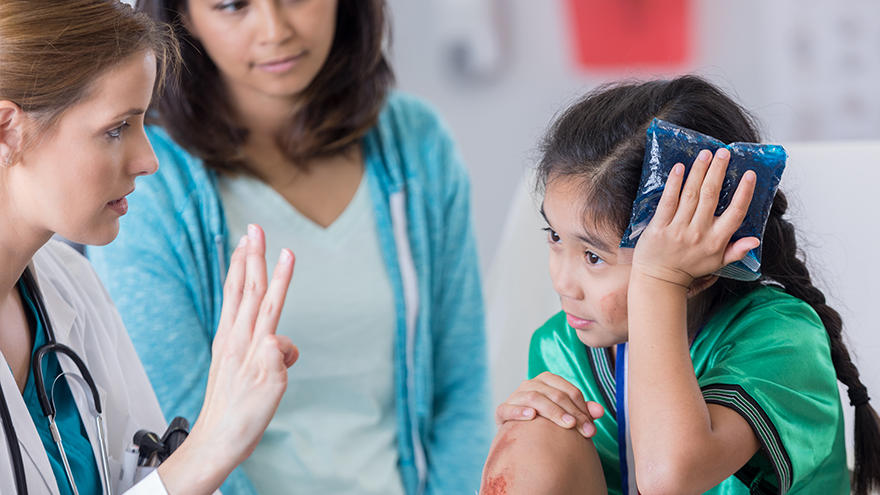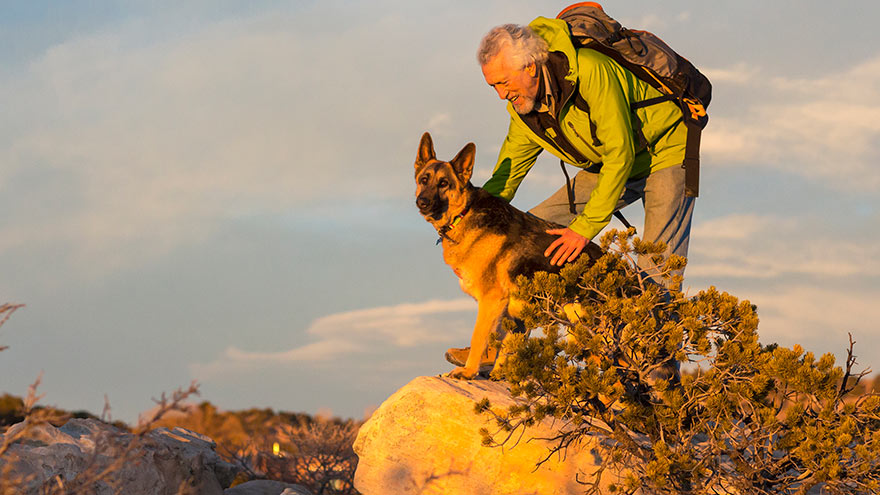Buscar
-
¿Por qué son importantes los exámenes anuales y las pruebas de rutina?
March is Colorectal Cancer Awareness Month, and we want you to receive the best preventative care possible. Early detection can help prevent serious illness, yet many people still choose to skip their annual exams and routine screenings. Bonnie Ferrara, MD, MPH, Section Chief for Primary Care at Renown Medical Group, further explains the importance of this simple, easy way to stay healthy. Why are annual exams so important? The benefits of early detection and prevention to save lives and reduce the impacts of disease have been proven. These exams are the perfect opportunity to get your health questions answered. “This is your chance to sit down with your provider and talk about your overall health and your family’s health history as well as your concerns for the future,” says Bonnie Ferrara, M.D., family medicine. “It’s the opportunity for your provider to talk with you about your lifestyle, tobacco use, exercise and alcohol use, all of which make a difference in your future longevity.” The annual wellness exam is also an ideal time for most adult patients to discuss health screenings. In addition, these visits are the perfect time to address issues that may not directly relate to a particular medical problem or immediate illness. A good rule of thumb is to schedule these appointments around your birthday each year to make sure you and your provider are both updated on your care. Why would you need an annual exam if you aren’t feeling sick? According to Dr. Ferrara, seeing your care provider when you aren’t sick is one of the best times. “It is better if you try to arrange this visit when you are not feeling ill,” she says. “It is an opportunity to talk about wellness. Not only how to contribute to your wellness but also the changes that you can make that will make huge dividends in the future for your wellness. In addition, it allows us to do some education about what to expect in the coming years as far as your health and lifestyle changes.” What can you expect at an annual exam? Annual exams usually check your: History – lifestyle behaviors, health concerns, vaccination status, family medical history Vitals – blood pressure, heart rate, respiration rate and temperature General appearance – your care provider can find out a lot about you just by watching and talking to you Dr. Ferrara adds, “If this is a Medicare annual wellness exam, it is an opportunity to talk to your provider about depression and dementia as well as be tested for those.” You can also leverage your annual exam to speak to your provider about managing your chronic health problems. "As a provider, these visits give us the opportunity to hear how the medications and lifestyle changes we have recommended are working and if you are having problems with these, we have the opportunity to make suggestions of how to do things better for the future," Dr. Ferrara.
Read More About Why are Annual Exams & Routine Screenings Important?
-
What is Disordered Drinking?
An alcohol problem can affect anyone at any age. Many factors, including job stress, genetics or depression, may contribute to the start of disordered drinking. Drinking alcohol exists on a continuum. For example, if someone feels down in the dumps for some time, it doesn’t mean they are clinically depressed. So if someone goes through a period with above-normal alcohol consumption, it doesn’t necessarily mean they abuse alcohol. Although “alcoholic” and “alcoholism” are common, they are not clinical descriptions. Alcohol use disorder is the preferred term. Symptoms are often mild but can be the start of a more significant problem. According to the National Institutes of Health (NIH), over 16 million adults live with alcohol use disorder. Symptoms of Alcohol Use Disorder Do you recognize any of the following symptoms in yourself or someone you know? Drinking more or longer than intended Trying to cut down or stop drinking but not able to Having to drink more than you once did to get the same feeling Being annoyed when family members discuss your drinking Regretting your behavior while you were drinking
-
6 consejos para palear la nieve de manera segura
While the appearance of a winter wonderland in your yard can be a welcome one, an accompanying aspect is not: the idea of clearing your driveway and sidewalks. The sometimes-daunting task of snow shoveling is a repetitive activity that can cause muscle strain to the lower back and shoulders. However, by following the tips below, you will spend more time appreciating your winter wonderland -- when your sidewalk and driveway are all clear, that is. But, we all know that injuries happen, and if you do find yourself with back pain that does not resolve in a few days, contact your primary healthcare provider, or visit a Renown Urgent Care. Another way to avoid injury during strenuous activity, or help heal an injury that won't go away, is to work with a physical therapist who can offer at-home exercises to keep your body strong. 6 Tips for Safe Snow Shoveling Following these tips from the American Physical Therapy Association can help you avoid injuries: Lift smaller loads of snow, rather than heavy shovelfuls. Be sure to bend your knees and lift with your legs, rather than your back. Use a shovel with a shaft that lets you keep your back straight while lifting. A short shaft will cause you to bend more to lift the load. Using a shovel that’s too long makes the weight at the end heavier. Step in the direction where you are throwing the snow to prevent the low back from twisting to help prevent “next-day back fatigue.” Avoid excessive twisting because the spine cannot tolerate this motion. Bend your knees and keep your back as straight as possible so that you are lifting with your legs. Take frequent breaks when shoveling. Stand up straight and walk around periodically to extend the lower back. Backward bending exercises while standing will help reverse the excessive forward bending of shoveling. Stand straight and tall, place your hands toward the back of your hips and bend slightly backward for several seconds. When in doubt, ask for help. The Reno community is a generous one and you can typically find snow shovelers for hire on local message boards like Nextdoor and Facebook. Or, if you have a kid in your neighborhood, they might be looking to make some extra money on a snow day.
-
Lyme Disease: 3 Things You Should Know
Approximately 476,000 Americans are diagnosed and treated for Lyme disease every year. Lyme disease is an infection that is transmitted to humans through the bite of infected black-legged or “deer” tick. It’s the most common and fastest-growing vector-borne disease in the United States. This bacterial infection, if left untreated, can cause serious pain, fatigue and other crippling symptoms. Keeping an eye out for early signs of Lyme disease, implementing prevention techniques and understanding testing and treatment options can go a long way in maintaining your health. We consulted with Peter O’Reilly, PA-C at Renown Medical Group – South Carson to learn more. 1. Recognizing the Signs of Lyme Disease Lyme disease is extremely easy to misdiagnose, given that most of its early signs and symptoms mimic those of other conditions, such as COVID-19. Common Lyme Disease symptoms include: Fever Chills Joint or muscle pain Swollen glands Extreme fatigue Headache The primary initial symptom that occurs in about 80 percent of Lyme disease cases is a “bulls-eye” rash that spreads around the site of the tick bite – called “erythema migrans.” Tick bites can be hard to find and not everyone gets the classic bullseye rash, making Lyme disease difficult to self-diagnose. O’Reilly suggests talking to either your primary care doctor or infection doctor as soon as possible if you’re concerned about Lyme disease.
-
Attending Burning Man? Health Tips From Renown
Renown Health welcomes you back from Burning Man. To make sure you have the support you need, here are some tips on where to get healthcare after your return from the playa. Our urgent cares see patients 365 days a year for medical concerns that are urgent but not life-threatening. This can include fractures, cuts, burns, sprains, fevers, animal bites, rashes, sore throats and fevers. Where To Get COVID-19 & Monkeypox Tests in Reno-Sparks Renown Health’s emergency rooms do not provide walk-in COVID-19 or monkeypox testing for patients. If you are experiencing symptoms related to COVID-19 or monkeypox, we recommend you make an appointment with your primary care provider or visit one of our urgent care locations. Testing for COVID-19 is also available at local pharmacies in the Reno-Sparks area. Please visit Washoe County's COVID-19 page to learn more. Labor Day Holiday Hours: Fernley and Fallon urgent care locations will be open from 9 a.m. to 3 p.m. on Monday, Sept. 5; all other Renown urgent care locations are open from 9 a.m. to 5 p.m.
Read More About Attending Burning Man? Health Tips From Renown
-
7 Important Vasectomy Questions for Your Doctor
If you and your partner are looking for a more permanent birth control method, you might consider a vasectomy. Although vasectomies are common, knowledge about them isn’t quite as common or talked about. If you are considering a vasectomy, talking with your primary care doctor is a great way to learn more and start the process. We consulted with Dr. Aurosis Reddy a primary care doctor with Renown Health – South Carson, about key topics to discuss with your doctor when considering a vasectomy. What is a vasectomy? A vasectomy – also called male sterilization – is a form of male birth control that blocks sperm from reaching semen, according to the American Urological Association (AUA). How effective and safe are vasectomies? Vasectomies are one of the most effective methods of birth control with a long-term success rate of over 99%. A vasectomy has been a safe and successful birth control method for many years. More than 500,000 men elect to have vasectomies every year in the U.S., and the number is rising. A vasectomy is also generally a low-risk procedure with a low complication rate ranging between 1-2%. What does the recovery period look like? A vasectomy is typically a quick procedure that takes under thirty minutes and can be performed in an outpatient setting under local anesthesia. Recovery from a vasectomy is also considered relatively easy. After a vasectomy, most can: Resume everyday activities within two to three days Resume normal exercise in one week Start engaging in sexual activity again in one week Your doctor can provide more details on what your individualized recovery process will look like.
Read More About 7 Important Vasectomy Questions for Your Doctor
-
Monkeypox: A Renown Expert Weighs In
Renown Health is closely following the national outbreak of the monkeypox virus and urging healthcare providers to be alert for patients with illnesses associated with a rash. In working with the Washoe County Health District (WCHD), Renown is closely monitoring the spread of monkeypox in the community and looking to prevent and reduce the spread of monkeypox. To help to ease worries, we consulted with Paul De Leon, Infection Preventionist at Renown Health. What Exactly is Monkeypox? Monkeypox is a rare viral illness caused by the monkeypox virus — the same family of viruses that causes Smallpox. Although symptoms are similar to Smallpox, monkeypox symptoms are milder and rarely fatal. However, it's important to mention that this virus can be more severe for these susceptible groups: Immunocompromised Pregnant women A fetus or newborn baby Women who are breastfeeding Young children Those with severe skin diseases such as eczema How is Monkeypox Transmitted? The monkeypox virus is not easily transmitted but occurs through sustained person to person close contact with an infected individual. Monkeypox can also be transmitted through direct contact with infectious rash, scabs, or body fluids. Monkeypox can also be spread through prolonged intimate physical contact, such as kissing, cuddling or sex. Lastly, monkeypox can be spread through contaminated linens or bedding. Transmission through respiratory secretions is uncommon but has been reported after prolonged face-to-face contact with symptomatic individuals. In addition, pregnant women can spread the virus to their fetuses through the placenta. Monkeypox Testing If you think you have monkeypox, contact your primary care physician or other medical providers to obtain testing. Notify the provider ahead of time before entering the physical office. Signs & Symptoms This current outbreak of West African monkeypox does not have the typical presentation of classic monkeypox. Symptoms usually appear one to three weeks after infection and include: Pimple-like rash or blisters on the face, inside the mouth, and on other areas of the body, like the hands, feet, chest, genitals, or anus. The rash will go through serval stages, including scabs, before healing and may be painful or itchy. Other symptoms of monkeypox can include: Fever Headache Muscle aches and backache Swollen lymph nodes Chills Exhaustion Respiratory symptoms such as sore throat, nasal congestion, or cough Symptoms of monkeypox may occur before or after a rash with some individuals only report experience a rash. Individuals with monkeypox are infectious once symptoms begin and remain infectious until lesions form scabs, scabs fall off, and a fresh layer of skin forms. The illness typically lasts 2-4 weeks.
-
Concussion Risks and Prevention
It’s important to be aware of the risk of a concussion, which can have serious health implications. Susan Park, MD, discusses the effects of concussions and how they can be prevented. According to Susan Park, MD, a Renown Medical Group doctor who specializes in sports and family medicine, concussions are a serious issue — especially among children whose developing brains “are more susceptible to brain injury and long-term effects from concussions.” All parents, coaches and athletes, she points out, should be aware of the risks of concussions and take precautions to avoid them. What is a concussion and how does it occur? Dr. Park describes a concussion as a traumatic brain injury resulting from direct or indirect impact to the head or body, during which the brain shakes back and forth in the skull. This may cause some bruising of the brain. In severe cases, traumatic head injuries can cause bleeding, which if not treated quickly, can be fatal. What are the health implications of a concussion? Symptoms of drowsiness and confusion can be a sign of a concussion after a head injury. Some short-term effects may include headaches, dizziness and difficulty concentrating. Long-term concerns can further include mood disorders, sleep disturbance and problems with cognitive function-concentration, which may affect school performance. What sports carry the highest risk of suffering a concussion? Dr. Park notes participation in any impact sport can result in a head injury. But among school-age kids, she treats more concussions from football and soccer than any other sport. However, during the winter months, skiing and snowboarding injuries can be a common cause of concussions Any blow to your head, neck or upper body can result in a concussion with symptoms including, but not limited to, feeling dazed or confused, dizziness, nausea/vomiting or a headache. Initial treatment of concussions varies depending on severity. Rest, avoiding vigorous activity and a reduced school workload help young athletes recover after a concussion. Dr. Park notes that sometimes further imaging and an ER visit will be required. Otherwise, rest from activities is the main treatment, along with not returning to sports activities until further clearance from a healthcare provider.
-
Three Things to Know About the Enhanced Benefits of Renown’s New Medicare Program
Renown Health recently announced that it has contracted with the Centers for Medicare and Medicaid Services (CMS) on a new program that offers enhanced Medicare benefits for Medicare beneficiaries. This new direct contracting Medicare program is designed specifically for patients with Original Medicare. Here are three things to know about Renown’s new program: The goal of the program is to help care providers work together to improve patients’ health by better coordinating patient care and reducing costs. Medicare beneficiaries who choose to sign up will have peace of mind knowing that they are in a program that ensures coordinated care along with potential cost-sharing assistance for chronic care management. Signing up for this program is easy – and it does not affect your existing Medicare benefits in any way. Simply click the button below, select either your current Renown Health or Geriatric Specialty Care provider from the drop down menu, complete the form and click “Submit Form.” It only takes a minute or two to fill out the form. You will be asked to provide the name of your primary care provider and be sure have your red, white, and blue Medicare card handy. Sign Up for Renown’s Enhanced Medicare Benefit Program Voluntary Alignment Sign Up Note: Participation in this program is voluntary. If you choose to sign up, your benefits will NOT change, and you can visit any doctor, other health care professional, or hospital. Learn more about Renown’s Direct Contracting Entity for Medicare Beneficiaries here. The statements contained in this document are solely those of the authors and do not necessarily reflect the views or policies of CMS. The authors assume responsibility for the accuracy and completeness of the information contained in this document.
Read More About Three Things to Know About the Enhanced Benefits of Renown’s New Medicare Program
-
Emergency Hiking Kit Essentials
With the help of Aaron Bertalmio, MD of Renown Urgent Care, we're sharing nine essential must-have items for your hiking emergency kit. 9 Essential Items For Your Hiking Emergency Kit With more than 300 days of sunshine in Reno-Tahoe and plenty of trails to explore, you'll want to keep these essential items in your kit. 1. Water Surprisingly, this no-brainer, however, is often overlooked. Bring enough water to last for the entire adventure. This amount of water can be heavy depending on the distance, altitude or intensity. With this in mind, the next best bet is to filter or purify water from a lake or stream. Here's how: You can do this with iodine or chlorine dioxide tablets, charcoal or an ultraviolet light wand. Tip: Look for water that is moving or rushing over rocks. Having enough water or filtration cannot be underestimated. "If you become injured and need to wait for help, you can only last about three days without water," Dr. Bertalmio says. 2. Food Meals-Ready-to-Eat (MREs) or dehydrated food pouches are essential, ensuring you have plenty to eat if you're outdoors longer than expected. 3. Maps Bring a printed map, compass or GPS. You can't always rely on your smartphone, so this is the perfect backup plan. 4. First-Aid Supplies Your hiking first-aid kit should change based on the type of hiking. As a basic rule, keep the following items in your pack: Fever/pain reliever Sewing kit with safety pins Tweezers Bandages and moleskin Antibiotic ointment Duct or medical tape Whistle 5. Light Source Wear or pack a small headlamp to illuminate the way if you get caught outside after sunset or in a poorly lit area. Headlamps are also great in emergencies because they are hands-free. 6. Emergency Shelter Even if you're only going out for the day, pack a low-weight emergency blanket for the trip. In other words, if the day trip turns into an overnight adventure, the blanket will keep you warm and alive in the event of cold temperatures. 7. Fire Starter Pack small tools in your hiking emergency kit to ensure an easy fire start. Waterproof matches, a knife, a lighter, or a strike fire starter are great options. Tip: Bring a multi-tool, including a knife and scissors that can be used for first-aid. 8. Layers of Clothing Mother Nature likes to change her mind in northern Nevada, and temperatures vary significantly within 24 hours. Therefore, pack a compact, lightweight waterproof and windproof jacket. This will protect you from being uncomfortably chilly and experiencing hypothermia. "Hypothermia is when your body temperature drops to a dangerously low level. You want to avoid this completely by keeping body temperature regulated outdoors and avoiding cold water immersion," says Dr. Bertalmio. 9. Sun Protection Certainly, sun protection should be part of your daily routine and an essential in your hiking emergency kit. You'll want to bring enough sunblock to reapply in direct sunlight and layers to cover exposed skin every two hours. Dr. Bertalmio reminds everyone the sun is intense in northern Nevada. "The higher altitude means an increased risk of sun-induced skin damage," he explains. "Some trails can reach above 10,000 feet, and at that altitude, UV radiation could be 35 to 45 percent more intense than at sea level."
-
3 datos importantes de atención médica para la generación milenial
Many millennials are fortunate to have good health, but it’s important to be prepared for your next doctor’s visit. Here are three things that millennials should stay on top of for tracking and maintaining their health. For many millennials, doctor visits and preventive healthcare fall by the wayside. Alison Lynch, MD, a family medicine provider with Renown Medical Group says there are a few key things you can do now to set yourself up for a healthy future. 1. Establish with a Primary Care Provider Millennials are more likely to go to urgent care or consult the internet when a healthcare issue arises. While these are helpful tools, here’s a better one: a primary care provider. The benefit of establishing with a primary care provider is that your medical records, history and a baseline for your health will be documented. That means that when a problem or question comes up, your doctor will already have helpful information on file and can help you navigate your needs. Having a primary care provider is often required for prescription refills and referrals to a specialist. By establishing now, you’ll be able to get what you need in the future much faster. Make an Appointment Today 2. Protect Yourself and Your Community There are a few vaccinations and screenings that Dr. Lynch recommends for millennials. Flu Shots: These are available every year and are recommended for protecting not only yourself against the flu but also others you may come into contact with. Flu shots are usually available from August through December through your healthcare provider, pharmacies and pop-up events. Tetanus or Tdap: Most people receive a tetanus shot as a child, but it’s recommended that everyone get a booster every 10 years. If you are overdue, talk to your primary care provider or pharmacist about getting updated. Pap smear: If you’re a woman, a pap smear is recommended every three years in your 20s and every five years in your 30s. HPV vaccine: This vaccine helps prevent the virus that causes cervical cancer as well as the majority of head and neck cancers and warts. The HPV vaccine is recommended for all genders up until age 45. STD screening: Consider an STI/STD screening if you’re sexually active.
-
Tips for Coping with Smoke-Related Health Problems
Millions of people across the west live in areas where air pollution can cause serious health problems. In addition, local air quality can affect our daily lives. Who is Affected? Kouros Farro, MD, a physician with Renown Urgent Care, advises that certain people are more likely to be affected when fine particle pollution reaches an unhealthy level. People who have asthma or other breathing conditions like chronic obstructive pulmonary disease (COPD). People who have heart disease or high blood pressure. Children and older adults. People of all ages who are doing extended or heavy physical activity like playing sports or working outdoors. “Everyone should take precautions when the air quality is unhealthy. Air pollution can aggravate heart and cardiovascular disease as well as lung diseases like asthma and COPD. When the air quality is unhealthy, people with these conditions may experience symptoms like chest pain, shortness of breath, wheezing, coughing, or fatigue. If you are experiencing any of these symptoms, use your inhalers as directed and contact your health care provider,” says Dr. Farro, who is board certified in family medicine and practices at Renown Urgent Care at 975 Ryland St. in Reno. “If you do not have a health care provider, there is a Renown Urgent Care office on almost every corner, with providers ready to see you.” Dr. Farro advises the following: Take it easy and listen to your body. Limit, change or postpone your physical activity level. If possible, stay away from local sources of air pollution like busy roads and wood fires. If you have asthma or other breathing conditions like COPD, make sure you have your relief/rescue inhaler with you. People with asthma should review and follow the direction in their written asthma action plan. Make an appointment to see your health provider to be sure you have an asthma action plan. Getting Same-Day Care Renown Urgent Care provides same-day treatment for a wide range of minor injuries, illnesses and medical concerns that are urgent but not life-threatening. Avoid the long wait times and high emergency room prices at 11 convenient sites, including Reno, Sparks, Carson City, USA Parkway, Fallon and Fernley. You can walk in or book ahead online. Make an Urgent Care Appointment Community Health Resources The Washoe County Health District offers online health information on its Smoke Smart website, including fire information, daily air quality information, fire and smoke maps and how to protect yourself. In addition, an online subscription page allows you to sign up for EnviroFlash, notifying you about air quality.
Read More About Tips for Coping with Smoke-Related Health Problems











